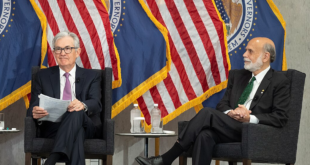Much of the developed world is slipping into a hyperregulated malaise. Growth rates are down across most major economies, and the developing countries are catching up to our errors almost as fast as they are growing. Increasingly, even in the US you would have to be outside the norm to afford a house by age forty. The median age of a first-time homebuyer in 2023 is the same as a repeat buyer in 1981. We’re not allowed to build and grow, but we’re told everything is...
Read More »They’ll Never Pay Down the National Debt
Ryan McMaken and Tho Bishop talk with Jane Johnson about why the feds will never pay down the debt. Instead, they have two choices: rampant inflation or default. Discussed on the Show "The Federal Mega-Debt is Here to Stay" by Jane L. Johnson: Mises.org/RR_174_A Claim your free book: Mises.org/RothPodFree Be sure to follow Radio Rothbard at Mises.org/RadioRothbard. Radio Rothbard mugs are now available at the Mises Store. Get yours at Mises.org/RothMug...
Read More »Condemnation of Navalny’s death, ban on Hamas, new taxes for married couples | 3 stories from 🇨🇭
Here are three news stories from Switzerland you shouldn't have missed this week. Tap the links below to find out more. ??Neutrality trumps Navalny in measured Swiss criticism of Russia: https://www.swissinfo.ch/eng/foreign-affairs/neutrality-trumps-navalny-in-measured-swiss-criticism-of-russia/72855730 ?Switzerland mulls five-year ban on Hamas as terror group: https://www.swissinfo.ch/eng/foreign-affairs/switzerland-mulls-five-year-ban-on-hamas-as-terror-group/72854570 ?Switzerland moves...
Read More »The Death of Easy Money Has Been Greatly Exaggerated
Reports on the death of the present cycle of politically motivated monetary easing, in the words of Mark Twain, grossly exaggerated. Contemporary market analyses are full of how the Fed and ECB are dialing back on previous hints of Spring 2024 rate cuts. In tune with this, commentators are lauding the central banks, especially the Fed, for a show of political independence as elections approach. The bigger picture though suggests otherwise. In the economic aftermath...
Read More »The war in Ukraine – what’s next? | Listen to our Inside Geneva #podcast
The approaching second anniversary of Russia’s aggression in Ukraine marks a grim toll: thousands killed, towns in ruins, and millions of refugees. Where do we go from here? Listen to our Inside Geneva podcast to find out: ?Apple podcasts: https://podcasts.apple.com/ch/podcast/the-war-in-ukraine-whats-next/id1506227169?i=1000645968866 ?Spotify: https://open.spotify.com/episode/6veyHSIE8RTH3kFFBvXTfo --- swissinfo.ch is the international branch of the Swiss Broadcasting...
Read More »Living Free in an Unfree World
The State knows no limits when it comes to intervening in the economy and our lives. From the value of our hard-earned income to the flow of water in our showerheads, nothing is out of reach for meddling bureaucrats. Ludwig von Mises explained, "The ultimate basis of an all around bureaucratic system is violence." Yet we advocate and hope for a world of peaceful cooperation and flourishing markets. It's doubtful that politics holds all the answers. We cannot just...
Read More »The Outrageous Persecution of Julian Assange
Today marks the second and final day in what could very well be Julian Assange’s last extradition trial in front of the British High Court. For almost five years now, the United States government has been working to get the Wikileaks founder extradited to the US to face charges that he violated the Espionage Act. Inspired by Daniel Ellsberg’s release of the Pentagon Papers back in 1971, Julian Assange founded Wikileaks in 2006. Assange’s vision was to develop an...
Read More »China’s CSI 300 Rises for Seventh Consecutive Session and Offshore Yuan Strengthens for the Sixth Session
Overview: The dollar is trading quietly after being sold yesterday. It is still soft against the dollar bloc and the Swiss franc but is firmer against the other G10 currencies. Narrow ranges have dominated. Emerging market currencies are mixed, with central European currencies and the Taiwan dollar trading softer. The offshore Chinese yuan is firmer for the sixth consecutive session. The highlights of today's North American session features minutes from last month's...
Read More »Forget Being the World’s Policeman; the Federal Government Can’t Even Keep DC Safe
While US taxpayers pay billions for military missions around the world in the name of “keeping us safe,” the federal government fails to keep residents of the nation’s capital safe from violent crime. Original Article: Forget Being the World's Policeman; the Federal Government Can't Even Keep DC Safe [embedded content]...
Read More »How Carl Menger and the Austrians Helped to Steer Economic Theory in the Right Direction
When Adam Smith and the English classicals promoted division of labor as the most important ingredient in economic development, it took Carl Menger and his Austrian successors to point out that error and promote the proper economic theory of production. Original Article: How Carl Menger and the Austrians Helped to Steer Economic Theory in the Right Direction [embedded content]...
Read More » SNB & CHF
SNB & CHF






